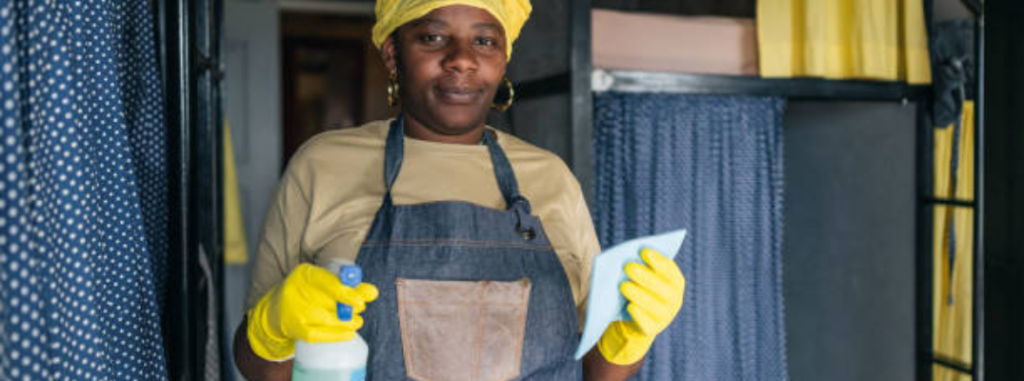21st-century work demands have created and strengthened our need for domestic workers, unlike previous decades when members of the family could easily manage the chores within the home. Domestic duties such as gatekeeping, house cleaning, driving, taking care of children or elderly, washing, ironing and so on are often outsourced to our domestic workers. This reduces stress and also creates employment for those with limited skills and education. Though abundant stories abound about the inhumane treatment many homes mete out on these domestic workers, which is a labour exploitation and human right abuse issue. Nor is it about hiring underage children (people below working age) as domestic workers, which is child labour and therefore criminal. The focus of this piece is on the education of domestic workers.
Domestic workers comprise a significant part of the global workforce in informal employment working for private households and may work on a full-time or part-time basis. They are sometimes employed by a single household or by multiple employers and may be residing in the household of the employer (live-in worker) or may be living in his or her own residence (live-out). The International Labour Organization estimates that there are currently at least 67 million domestic workers globally excluding the millions of children occupied in domestic work.
Since our domestic workers are often ‘grown-ups’ there is a tendency for us to think that they don’t need to be offered basic and quality education. We sometimes assume that they made the choice regarding their career path and providing them with an education will be a distraction. Others think that empowering them through providing a quality education is irrelevant as the work they are hired for does not require it. After all, does anyone need to understand Arithmetic to sweep the floor?
But wait, the aim of ‘Quality Education’ as the 4th Goal of the SDGs is to ensure inclusive and quality education for all while promoting lifelong learning’. This highlights the critical role of universal education and continuous learning as a hallmark of attaining development in any given country. A nation is a sum total of its citizens and when a considerable number of citizens are not empowered/educated, that nation will be backward. Education is a strategic pillar of the SDGs and only empowered/knowledgeable citizens can understand the essence and readily relate to the global development agenda. For if everyone has quality education and embraces continuous learning, advocacy on the SDGs will be minimal.
But how do we educate our domestic workers?
UNICEF (2000) described quality education as comprising of five key component:
- Learners who are healthy, well-nourished and ready to participate and learn, and supported in learning by their families and communities;
- Environments that are healthy, safe, protective and gender-sensitive, and provide adequate resources and facilities;
- Content that is reflected in relevant curricula and materials for the acquisition of basic skills, especially in the areas of literacy, numeracy and skills for life, and knowledge in such areas as gender, health, nutrition, HIV/AIDS prevention and peace.
- Processes through which trained teachers use teaching approaches in well-managed classrooms and schools and skillful assessment to facilitate learning and reduce disparities.
- Outcomes that encompass knowledge, skills and attitudes, and are linked to national goals for education and positive participation in society.
These principles can be imbibed in equipping our domestic workers with a good education. However, the first step is to make them see the need to be educated (if they are not educated), the next is to express your interest in helping them attain quality education at little or no cost to them and finally work out the modality for this empowerment initiative.
In most cases, the majority of domestic workers do this as a means to an end (gather money to start an enterprise or go back to school) but some also chose that as a lifetime career. Depending on the work they do and the time available, they can be educated using a variety of methods such as :
- Through the use of home tutors,
- Enrolling them in adult learning centres or
- Providing virtual learning resources that they can relate to.
As stated, while some of our domestic workers may still want to further their educational pursuits, others need that education as a tool for making informed decisions about their life choices which could help them lead a better productive life. As Darkenwarld and Merriam (1982) rightly put it –
‘Adult education is concerned not with preparing people for life, but rather with helping people to live more successfully. Thus if there is to be an overarching function of the adult education enterprise, it is to assist adults to increase competence, or negotiate transitions, in their social roles (worker, parent, retiree etc.), to help them gain greater fulfilment in their personal lives, and to assist them in solving personal and community problems’.
Providing our domestic workers with an education will not only allow society realize the aim of quality and continuous education for all but will also produce empowered citizens that could relate and participate in governance and other development agendas.
References:
Darkenwald, G. G. and Merriam, S. B. (1982) Adult Education. Foundations of practice, New York: Harper and Row.
International Labour Organization (2018) Who are domestic workers? Available at http://www.ilo.org/global/docs/WCMS_209773/lang–en/index.htm
United Nations Children Fund (2000) Defining Quality in Education. Working Paper Series. Education Section Program Division. UNICEF, New York.
Photo Source: MindMap-SA

